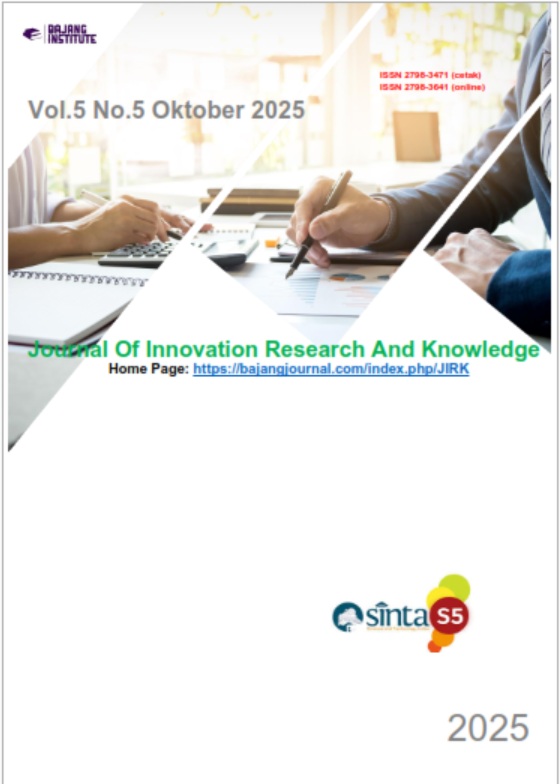WATER CONSERVATION AND BUSINESS RESEARCH: THEMES AND GLOBAL COLLABORATION, 1916–2025
Abstract
This study utilizes bibliometrics to examine global water conservation and business studies from 1916 to 2025. We investigated 3,083 Scopus publications on water conservation and business. The Bibliometric package in R, Biblioshiny for visualization. Annual publishing growth, significant nations, co-authorship networks, theme changes, and keyword trajectories are examined. The US leads in citations and international collaboration with 22.12% of documents, indicating a consistent increase in scientific production since the early 2000s. Thematic mapping shows established themes like environmental protection and sustainable development alongside underdeveloped but crucial ones like water supply and management. This field is globally as shown by important research in agroecology, hydrology, and environmental economics. Keyword analysis shows that business-related water research is using terms connected to sustainability. Research on scholarly trends and global collaborations over a century informs sustainable business practices and policymakers with evidence-based ideas.
References
Arias‐Navarro, C., et al. 2023. “Forty Years of Soil Research Funded by the European Commission: Trends and Future. A Systematic Review of Research Projects.” European Journal of Soil Science 74(5). https://doi.org/10.1111/ejss.13423.
Asdak, C., Yulizar, and Subiyanto. 2023. “A National Policy on Indonesia’s Integrated Water Resource Conservation Management.” Indonesian Journal of Forestry Research 10(2): 151–162. https://doi.org/10.59465/ijfr.2023.10.2.151-162.
Aslam, S., et al. 2021. “Sustainable Model: Recommendations for Water Conservation Strategies in a Developing Country Through a Psychosocial Wellness Program.” Water 13(14): 1984. https://doi.org/10.3390/w13141984.
Chen, Y.-L., and M.-C. Huang. 2024. “Recycling Water: Board Membership and Industry-Peer Pressures.” Management Decision 62(6): 1861–1884. https://doi.org/10.1108/MD-04-2023-0606.
Cobo, M. J., et al. 2011. “An Approach for Detecting, Quantifying, and Visualizing the Evolution of a Research Field: A Practical Application to the Fuzzy Sets Theory Field.” Journal of Informetrics 5(1): 146–166. https://doi.org/10.1016/j.joi.2010.10.002.
D’Amore, G., A. Vaio, D. Balsalobre‐Lorente, and F. Boccia. 2022. “Artificial Intelligence in the Water–Energy–Food Model: A Holistic Approach Towards Sustainable Development Goals.” Sustainability 14(2): 867. https://doi.org/10.3390/su14020867.
Derviş, H. 2020. “Bibliometric Analysis Using Bibliometrix an R Package.” Journal of Scientometric Research 8(3): 156–160. https://doi.org/10.5530/jscires.8.3.32.
Ergashova, D. T., S. A. Kasymbetova, and B. Sh. Matyakubov. 2023. “Cotton Drip Irrigation Using Magnetic Technology.” BIO Web of Conferences 71: 01093. https://doi.org/10.1051/bioconf/20237101093.
Erskine, O. M., et al. 2023. “Encouraging Water Protection Through Donation: Examining the Effects of Intention to Engage in Personal Water Conservation Behaviors on Donation Behaviors.” Water 15(13): 2365. https://doi.org/10.3390/w15132365.
Farooq, M., K. Naveed, F. Khalid, A. Narayan, and I. Khudir. 2025. “Examining the Extent and Quality of Corporate Water Management Disclosures in Extremely High-Water Stress Countries.” Sustainability Accounting Management and Policy Journal 16(3): 705–735. https://doi.org/10.1108/sampj-01-2024-0054.
Fuerst, S., O. Sanchez-Dominguez, and M. A. Rodriguez-Montes. 2023. “The Role of Digital Technology Within the Business Model of Sustainable Entrepreneurship.” Sustainability 15(14). https://doi.org/10.3390/su151410923.
Huang, T.-Y., and L. Yang. 2022. “Superior Identification Index: Quantifying the Capability of Academic Journals to Recognize Good Research.” Scientometrics 127(7): 4023–4043. https://doi.org/10.1007/s11192-022-04372-z.
Knai, C., M. Petticrew, S. Capewell, R. Cassidy, J. Collin, S. Cummins, … and H. Weishaar. 2021. “The Case for Developing a Cohesive Systems Approach to Research Across Unhealthy Commodity Industries.” BMJ Global Health 6(2): e003543. https://doi.org/10.1136/bmjgh-2020-003543.
Miguel, J. 2024. “Corporate Social Responsibility (CSR) and Sustainability in Water Supply: A Systematic Review.” Sustainability 16(8): 3183. https://doi.org/10.3390/su16083183.
Mulyanti, D., et al. 2024. “The Legal Policy Role of Groundwater Tax on Water Resources Conservation in Indonesia.” Journal of Law and Sustainable Development 12(2): e1673. https://doi.org/10.55908/sdgs.v12i2.1673.
Raman, R., et al. 2022. “Women Entrepreneurship and Sustainable Development: Bibliometric Analysis and Emerging Research Trends.” Sustainability 14(15): 9160. https://doi.org/10.3390/su14159160.
Wen, J., H. Li, and A. Meseretchanie. 2023. “Assessment and Prediction of the Collaborative Governance of the Water Resources, Water Conservancy Facilities, and Socio-Economic System in the Xiangjiang River Basin, China.” Water 15(20): 3630. https://doi.org/10.3390/w15203630.
Wyrwoll, P., and R. Grafton. 2021. “Reforming for Resilience: Delivering ‘Multipurpose Hydropower’ under Water and Energy Risks.” International Journal of Water Resources Development 38(6): 1032–1061. https://doi.org/10.1080/07900627.2021.1944844.
Yu, H., L. Kuo, and B. Ma. 2020. “The Drivers of Corporate Water Disclosure in Enhancing Information Transparency.” Sustainability 12(1): 385. https://doi.org/10.3390/su12010385.















